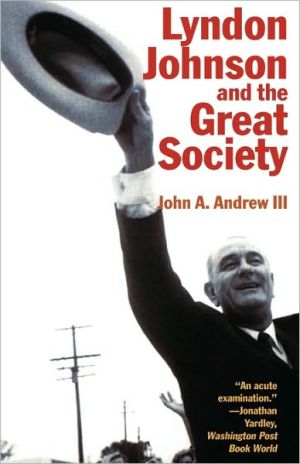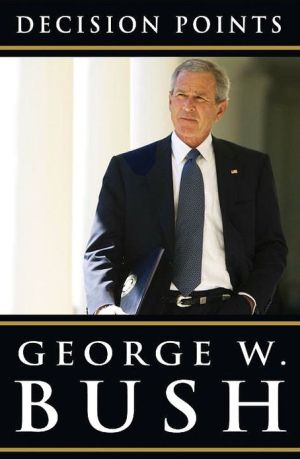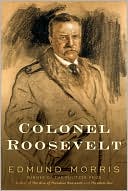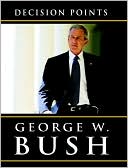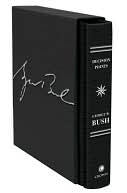Lyndon Johnson And The Great Society
Lyndon Johnson’s Great Society was the most ambitious and controversial American reform effort since the New Deal of Franklin Roosevelt. Conceived in a time of prosperity rather than devastating depression, it sought to forge a consensus that rested on ideals rather than harsh economic realities. In this narrative analysis, John Andrew examines the underlying ideas and principal objectives of Great Society legislation in the areas of civil rights, poverty, health, education, urban life, and...
Search in google:
In this narrative analysis, Mr. Andrew examines the underlying ideas and principal objectives of the most ambitious and controversial American reform effort since the New Deal. An acute examination. --Jonathan Yardley, Washington Post. American Ways Series. Presidential Studies Quarterly - H. Warren Gardner Sprightly...a valuable addition to the current research on arguably the most turbulent American decade of the twentieth century.
AcknowledgmentsIntroduction31From Civil Rights to Race232The War on Poverty563Health and Education954Model Cities1315Quality of Life1636Assessing the Great Society183A Note on Sources200Index208
\ Washington Post“Andrew's aim is to see the Great Society clearly, free of the distortions of partisan politics, and to an impressive degree he succeeds.”\ — Jonathan Yardley\ \ \ \ \ ChoiceConcise and cogent...an evenhanded analysis of the legacy of the Great Society.\ — A. J. Dunar\ \ \ Rapport“A must read for everyone.”\ \ \ \ \ H-Net Reviews“Andrew takes on all of the major policy initiatives of the period in admirable detail...a remarkable feat.”\ — Richard Flanagan\ \ \ \ \ Presidential Studies Quarterly“Sprightly...a valuable addition to the current research on arguably the most turbulent American decade of the twentieth century.”\ — H. Warren Gardner\ \ \ \ \ CHOICE“Concise and cogent...an evenhanded analysis of the legacy of the Great Society.”\ — A. J. Dunar\ \ \ \ \ H-Net: Humanities and Social Science Reviews Online“Andrew takes on all of the major policy initiatives of the period in admirable detail...a remarkable feat.”\ — Richard Flanagan\ \ \ \ \ Review Of Higher EducationAndrew's aim is to see the Great Society clearly, free of the distortions of partisan politics, and to an impressive degree he succeeds.\ — Jonathan Yardley\ \ \ \ \ Choice“Concise and cogent...an evenhanded analysis of the legacy of the Great Society.”\ — A. J. Dunar\ \ \ \ \ FlanaganAndrew takes on all of the major policy initiatives of the period in admirable detail...a remarkable feat. \ — H-Net Reviews\ \ \ \ \ Andrew J. DunarConcise and cogent...an evenhanded analysis of the legacy of the Great Society. \ — Choice\ \ \ \ \ H. Warren GardnerSprightly...a valuable addition to the current research on arguably the most turbulent American decade of the twentieth century. \ — Presidential Studies Quarterly\ \ \ \ \ Jonathan YardleyAn acute examination. . . . Andrew's aim is to see the Great Society clearly, free of the 'distortions' of partisan politics, and to an impressive degree he succeeds.\ \ \ \ \ Publishers Weekly\ - Publisher's Weekly\ This succinct survey of President Lyndon Johnson's Great Society initiative and its aftermath recounts the genesis and fates of the various programs that today will evoke a wave of nostalgia in those old enough to remember them, inter alia, the War on Poverty, Model Cities, the Civil Rights Act of 1964, the Voting Rights Act of 1965, Head Start. Andrew (The Other Side of the Sixties) is fair and humane as he dissects the individual components of the Great Society and evaluates their successes and failures while pointing out what he considers to have been flaws in the conception and design of some of the programs. Citing the period of the mid-'60s that gave birth to the Great Society as "a liberal interlude unmatched in the twentieth century... and unlikely to recur in the foreseeable future," Andrew argues that the biggest failure of the Great Society was "its lack of understanding and appreciation for the challenges it confronted. Once Americans saw the scope of the task, its complexity and costs overwhelmed them." This account is especially useful for helping us understand why though we're a people of wildly differing extremes of wealth, we have been dismantling federal welfare for our citizens. (Mar.)\ \ \ \ \ BooknewsFocuses on the US president's domestic program, the most ambitious since the New Deal of the 1930s. Argues that the consensus he forged in such areas as civil rights, poverty, health, education, urban life, and consumer issues was possible only by avoiding divisive issues. Concludes that the proposals made during prosperity lost much appeal as the economy deteriorated and the ideals of the 1960s collapsed into polarization. Annotation c. by Book News, Inc., Portland, Or.\ \ \ \ \ Jonathan YardleyAndrew's aim is to see the Great Society clearly, free of the 'distortions' of partisan politics, and to an impressive degree he succeeds. \ — Washing Post\ \
